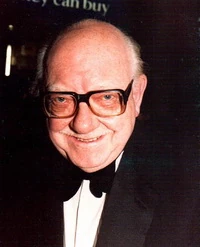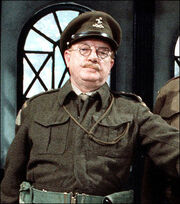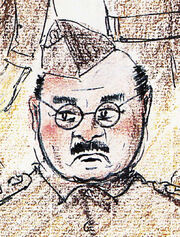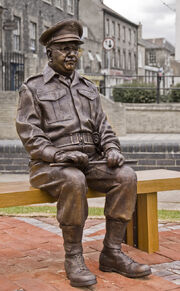| Actor | |

| |
|---|---|
| Arthur Lowe | |
| Born | 22nd September 1915 |
| Died | 15th April 1982 (aged 66) |
| First appearance | The Man and the Hour |
| Last appearance | Never Too Old |
| Series | 1 - 9 |
| Episode count | 80 |
Arthur Lowe (22nd September 1915 – 15th April 1982) was a BAFTA Award winning English actor. He was best known for playing Captain George Mainwaring in the popular British sitcom Dad's Army from 1968 until 1977.
Biography[]
Early life and army career[]
Lowe was born in Hayfield, Derbyshire as the only child of Arthur (1888–1971) and his wife Mary Annie (Nan) née Ford (1885–1981). As a child, he went to Chapel Street Junior School in Levenshulme, Manchester. Lowe’s original intention was to join the Merchant Navy, but this idea was thwarted because of his poor eyesight. After working in an aircraft factory, he joined the British Army on the eve of the Second World War, but not before experiencing his first brush with the acting world by working as a stagehand at the Manchester Palace of Varieties. Lowe served in the Middle East with the Duke of Lancaster's Own Yeomanry during the war, and began to take part in shows put on for the troops, which appears to have sparked his desire to act. He left the Army, in which he served as a radar technician, at the end of the war with the rank of Sergeant Major.
Early acting career[]
Lowe made his debut at the Manchester Repertory Theatre in 1945, where he was paid £5 per week for twice-nightly performances. Working all around the country, Lowe became known for his character roles, which included parts in the West End musicals Call Me Madam, Pal Joey and The Pajama Game. One of his earliest screen roles was a brief appearance as a reporter near the end of Kind Hearts and Coronets in 1949.
By the 1960s, Lowe had successfully made the transition to television, and landed a regular role as draper/lay preacher Leonard Swindley in the soap opera Coronation Street (1960–65). His character became sufficiently popular with viewers for him to appear in two spin-off series; Pardon the Expression (1966) and its sequel Turn out the Lights (1967). Swindley was not a role that Lowe relished though, and he longed to move on. During the months he was not playing Swindley, he was busy on stage or making one-off guest appearances in other TV series such as Z-Cars (1962) and The Avengers (1967).
Dad's Army[]

Arthur Lowe as Captain Mainwaring

A sketch of Arthur Lowe as Captain Mainwaring by James Beck
In 1968, Lowe was cast in his most famous role - as Captain Mainwaring in the BBC comedy-sitcom Dad's Army. Later, his former colleagues on the show remarked that this was the role that most resembled Lowe himself - pompous and bumbling. Lowe had a clause written into his contract specifying that he would never have to lose his trousers, which is why Wilson is leading the platoon during the changeover sequance in the feature film. Lowe also played Mainwaring's drunken brother Barry Mainwaring in the 1975 Christmas episode My Brother and I. He also took the character into a radio series and a stage show.
Other acting work and later career[]
When not involved in Dad's Army, Lowe appeared in plays at the National Theatre and the Royal Court Theatre. His film roles included Spike Milligan's surreal The Bed Sitting Room, in which he mutates into a parrot, the part of a drunken butler in The Ruling Class with Peter O'Toole, and an appearance in a Vincent Price comedy-horror movie Theatre of Blood, as one of the unfortunate critics.
Between 1971 and 1973, Lowe joined Dad's Army colleague Ian Lavender (who played Private Pike) on the BBC radio comedy Parsley Sidings. In 1974 he played Mr Micawber in the BBC serial David Copperfield, and also employed a multitude of voices on the 1974 BBC animated series Mr. Men, in which he voiced all the characters as well as narrated.
When Dad's Army run ended in 1977, Lowe remained much in demand, taking starring roles in television comedies such as Bless Me Father (1978–81) as the mischievous Irish priest Father Charles Clement Duddleswell – quite a departure from the pompous characters that Lowe usually portrayed – and Potter (1979–80), as busybody Redvers Potter.
By now he was making many television commercials (including one for Wispa bars, in which he appeared in-character as Captain Mainwaring), but his later stage career mainly involved touring the provinces, appearing in plays and pantomimes with his wife, Joan. In 1981, he reprised his role as Captain Mainwaring for the pilot episode of It Sticks Out Half a Mile, a radio sequel to Dad's Army. His last film role was in Lindsay Anderson's Britannia Hospital.
Final years and death[]
In his final years, Lowe's alcoholism spiralled out of control, and he was reduced to acting in pantomimes and touring theatre productions. Graham Lord's biography recalls that by 1979, Lowe was suffering from major health problems, but continued to drink ever increasing amounts of alcohol, sometimes passing out on stage or at dinner. He was also a heavy smoker and his weight ballooned.
Lowe had long suffered from narcolepsy, and collapsed from the onset of a stroke in his dressing room at the Alexandra Theatre in Birmingham before a performance of Home at Seven (in which he starred with his wife Joan) on 15th April 1982. He died in hospital early the following morning, aged 66. His last interview had been on the live BBC1 afternoon show Pebble Mill at One, only a few hours earlier.
Lowe's ashes were scattered at Sutton Coldfield Crematorium following a

Statue of Lowe's character Captain Mainwaring in Thetford.
sparsely attended funeral. Joan herself did not attend as she refused to miss a performance of Home at Seven and, as a result, was appearing in Belfast at the time. A memorial service was held in May 1982 at St Martin-in-the-Fields, attended by his family, former colleagues, and many friends. His last sitcom, A J Wentworth, BA (with Lowe as a boys' schoolmaster) was shown during July and August of 1982.
Legacy[]
In December 2007, plans were unveiled for a statue of Lowe as Captain Mainwaring to be erected in Thetford, where the outside scenes for Dad's Army were filmed. The statue was unveiled on 19th June 2010 by the two men behind the series' creation and scripts, Jimmy Perry and David Croft. Lowe has also had two blue plaques dedicated in his honour; one at Maida Vale, and one at his birthplace in Hayfield, Derbyshire.
Personal life[]
Lowe married Joan Cooper (1922–1989) on 10 January 1948. They had met in 1945 when she was his leading lady at the Manchester Repertory Theatre, and they remained together until his death. Their son, Stephen Lowe, was born in January 1953.
Lowe owned a distinctive former steam yacht, Amazon, which dated back to 1885. When touring at coastal theatres with his wife, Lowe used Amazon as a floating base. He bought the vessel as a houseboat in 1968, but realised her potential and took her back to sea in 1971; a unique example of Victorian boat design, she is still operating in the Mediterranean today. The ship had a bar with a semicircular notch cut halfway along, to enable both the portly figure of Lowe to serve behind the bar with his wife at the same time, acting as hosts during the parties they threw on board.
In an interview for a Dad's Army retrospective on BBC television in 2010, Lowe's co-star Clive Dunn (who portrayed Corporal Jones) described him sitting at the bar in the evenings when they were filming on location, consuming a drink which Lowe named 'Amazon' after his yacht. Dunn described the drink as comprising of "gin and ginger ale, with a single slice of cucumber".
Lowe was a staunch Conservative, which sometimes caused tension between himself and Dunn, who was a Labour party supporter. After turning down several offers, Dunn eventually accepted an OBE when Dad's Army ended, an offer which was reportedly also extended to Lowe; however, he apparently would only accept a "higher level of honour". The episode A Man of Action, in which Mainwaring declared martial law, has been said to have been played with such gusto by Lowe because it entailed what he believed should be done against the Labour government of the time. Dunn once claimed that Lowe once asked "Why don't they just shoot them?" in response to the 1973 miners' strike.